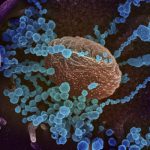The Coronavirus Disease (COVID-19) was declared a pandemic by the World Health Organisation earlier in the month, since then the no of confirmed cases and deaths has been increasing exponentially daily. In the midst of this global health crisis, there is an ongoing brouhaha on the social media platforms making the public carry out unhealthy acts.
In the medical science, we refer to myth as a widely held but false belief or idea. Most of the common myths about Coronavirus listed below were researched by the WHO.
COVID-19 virus can be transmitted in areas with hot and humid climates
From the evidence so far, the COVID-19 virus can be transmitted in all areas, including areas with hot and humid weather. Regardless of climate, adopt protective measures. The best way to protect yourself against COVID-19 is by frequently cleaning your hands. By doing this you eliminate viruses that may be on your hands and avoid infection that could occur by then touching your eyes, mouth, and nose.
Coronavirus does not affect older people, younger people and blacks
People of all ages can be infected by the new coronavirus (2019-nCoV). Older people, and people with pre-existing medical conditions (such as asthma, diabetes, and heart disease) are more vulnerable. No race is an exemption, it is a pandemic affecting all race.
Cold weather and snow CANNOT kill the new coronavirus.
There is no reason to believe that cold weather can kill the new coronavirus or other diseases. The normal human body temperature remains around 36.5°C to 37°C, regardless of the external temperature or weather.
Taking a hot bath prevents the new coronavirus disease
Taking a hot bath will not prevent you from catching COVID-19. Your normal body temperature remains around 36.5°C to 37°C, regardless of the temperature of your bath or shower. Actually, taking a hot bath with extremely hot water can be harmful, as it can burn.
Hand dryers are effective in killing the new coronavirus
No. Hand dryers are not effective in killing the 2019-nCoV. To protect yourself against the new coronavirus, you should frequently clean your hands with an alcohol-based hand rub or wash them with soap and water. Once your hands are cleaned, you should dry them thoroughly by using paper towels or a warm air dryer.
Spraying alcohol or chlorine all over the body will kill the new coronavirus
No. Spraying alcohol or chlorine all over your body will not kill viruses that have already entered your body. Spraying such substances can be harmful to clothes or mucous membranes (i.e. eyes, mouth). Be aware that both alcohol and chlorine can be useful to disinfect surfaces, but they need to be used under appropriate recommendations.
Vaccines against pneumonia protects against the new coronavirus
No. Vaccines against pneumonia, such as pneumococcal vaccine and Haemophilus influenza type B (Hib) vaccine, do not provide protection against the new coronavirus. The virus is so new and different that it needs its own vaccine. Researchers are trying to develop a vaccine against 2019-nCoV, and WHO is supporting their efforts.
Regularly rinsing or irrigating your nose with saline help prevent infection with the new coronavirus
No. There is no evidence that regularly rinsing the nose with saline has protected people from infection with the new coronavirus. There is some limited evidence that regularly rinsing or irrigation of nose with saline can help people recover more quickly from the common cold. However, regularly rinsing the nose has not been shown to prevent any respiratory infections including coronavirius.
Holding your breath for more than 10 seconds is an effective test for the novel coronavirus,
The claims are false; the World Health Organization and other experts said there was no evidence to support these claims.
Garlic help prevent infection with the new coronavirus
Garlic is a healthy food that may have some antimicrobial properties. However, there is no evidence from the current outbreak that eating garlic has protected people from the new coronavirus.
Drinking warm water with lemon protects against the novel coronavirus.
There is no proof this is effective in preventing the disease, practising good hygiene is the best way to stay healthy.
Chloroquine is used to treat COVID-19
This is misleading, while a study found the molecule showed “apparent efficacy” in treating the disease, trials are still ongoing.
Antibiotics are effective in preventing and treating the new coronavirus
No, antibiotics do not work against viruses, only bacteria. The new coronavirus (2019-nCoV) is a virus and, therefore, antibiotics should not be used as a means of prevention or treatment.
There are specific medicines to prevent or treat the new coronavirus
To date, there is no specific medicine recommended to prevent or treat the new coronavirus (2019-nCoV). However, those infected with the virus should receive appropriate care to relieve and treat.









